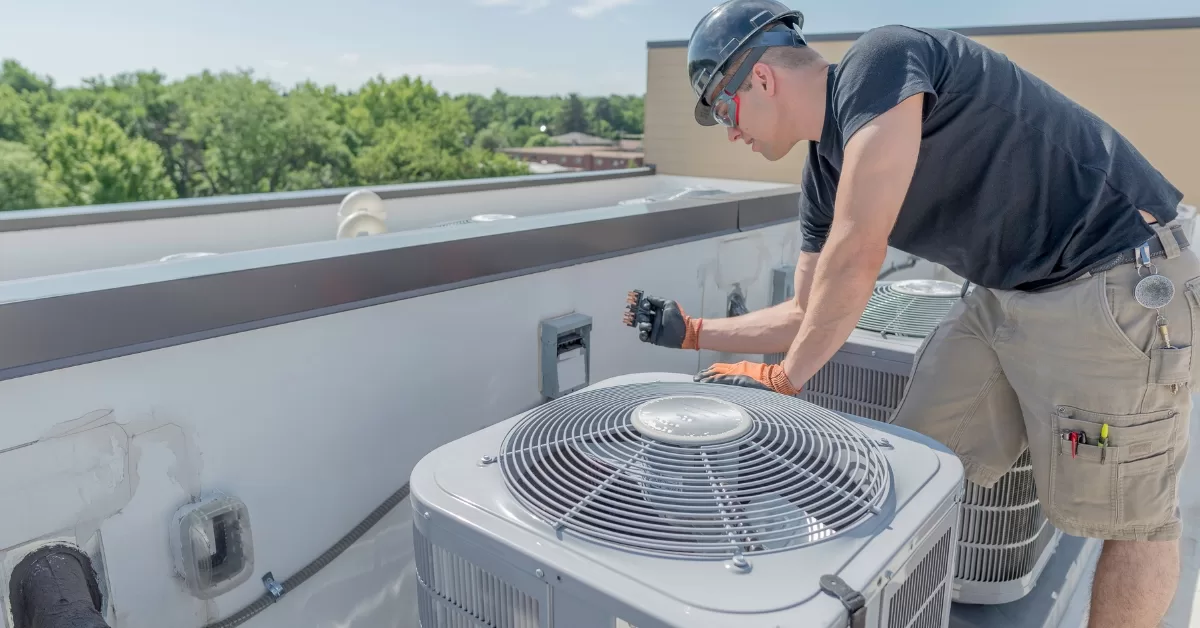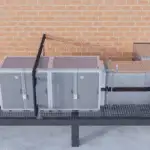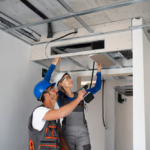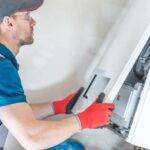Importance of preparing your seasonal HVAC for winter
Preparing your HVAC for winter is crucial to ensure it functions optimally during the colder months. Here’s why it’s important:
- Regular maintenance can help prevent costly breakdowns, as winter puts extra strain on your HVAC system.
- Proper preparation ensures that your home stays warm and comfortable throughout the winter, without any unexpected issues.
- Maintaining your HVAC system can also improve its energy efficiency, helping you save on your heating bills.
- Neglecting winter preparation may lead to decreased indoor air quality, as the system might distribute dust and other contaminants.
By taking the time to prepare your seasonal HVAC for winter, you can avoid potential problems and keep your home cozy and comfortable.
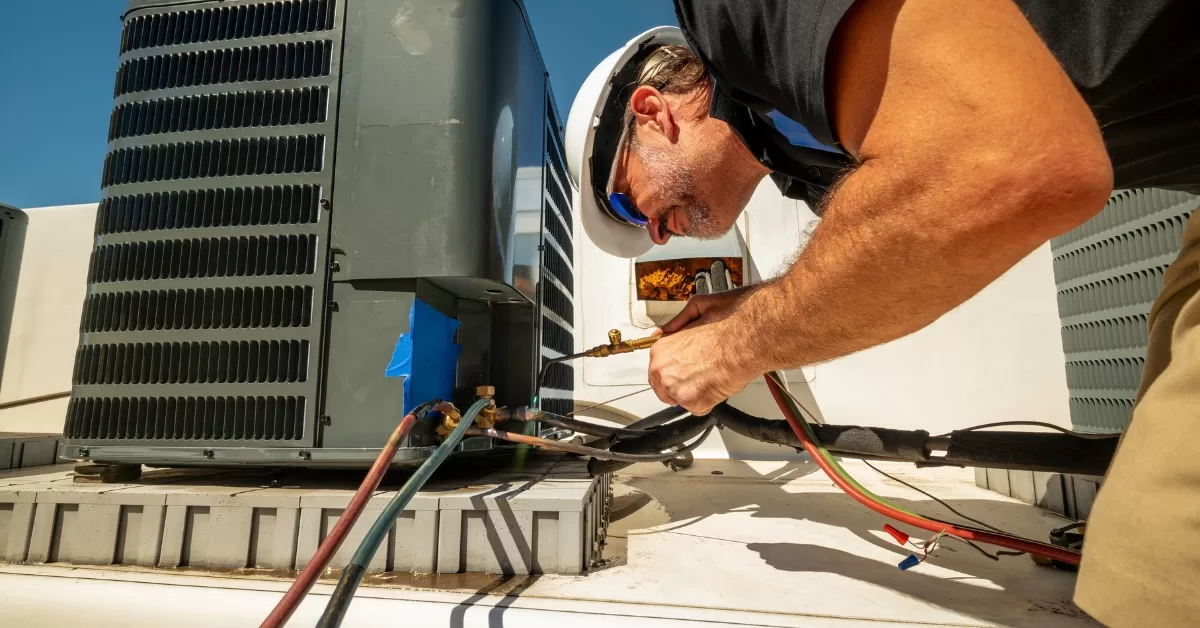
Understanding the seasonal HVAC system
When it comes to seasonal HVAC systems, it’s important to understand how they function and the steps you can take to prepare them for winter. Here’s what you need to know:
- The seasonal HVAC system is designed to regulate temperature and airflow in your home based on the time of year.
- Before winter arrives, it’s crucial to ensure that your HVAC system is in top condition to keep your home warm and comfortable.
- Regular maintenance, such as cleaning filters and checking for any issues, can help improve the efficiency and longevity of your HVAC system.
- By understanding how your seasonal HVAC system works, you can take proactive steps to save money on energy costs and avoid potential breakdowns during the winter months.
Checking for air leaks and insulation in preparation for winter
Before winter arrives, it’s crucial to assess your HVAC system for air leaks and ensure proper insulation. Air leaks in your home can lead to energy wastage and higher heating bills. Start by inspecting windows and doors for any drafts and sealing them with weatherstripping or caulking. Next, evaluate your attic, walls, and basement for adequate insulation to maintain indoor warmth and reduce heating costs. By addressing air leaks and enhancing insulation, you can maximize energy efficiency and save on heating expenses during the winter months.
Regular maintenance for optimal seasonal HVAC performance
Regular maintenance is crucial for ensuring optimal performance from your seasonal HVAC system, especially as winter approaches. Scheduled maintenance can help identify potential issues early, preventing costly repairs down the road. It also ensures that your heating and cooling system operates efficiently, saving you money on energy bills. Additionally, regular maintenance can extend the lifespan of your HVAC system, reducing the need for frequent replacements. Simple tasks such as changing air filters, cleaning vents, and checking for leaks can make a significant difference in your system’s performance. By prioritizing regular maintenance, you can ensure that your HVAC system is ready to handle the demands of the upcoming seasonal changes.
Setting and programming your thermostat for energy efficiency
To save energy and money, set your thermostat to a lower temperature when you’re asleep or away. The U.S. Department of Energy suggests a setting of about 68°F while you’re home and awake, and a lower setting while you’re asleep or away. You can also consider investing in a programmable thermostat that can automatically adjust the temperature based on your schedule. By lowering your thermostat by 7-10°F for 8 hours a day during the winter, you can save as much as 10% on your heating bills.
Importance of cleaning and replacing HVAC filters
You must clean or replace your HVAC filters regularly to maintain good air quality and system efficiency. Dirty filters can make your HVAC system work harder and can lead to increased energy consumption and higher bills. According to the Department of Energy, regularly changing or cleaning your filters can lower your system’s energy consumption by 5% to 15% and can also extend the lifespan of your HVAC system. Experts recommend checking your filters every month and replacing them every 90 days, or sooner if they are visibly dirty. Regular maintenance will help keep your system running smoothly and will save you money in the long run.
Inspecting and cleaning air ducts for improved indoor air quality
Air ducts play a crucial role in maintaining good indoor air quality. Inspecting and cleaning your air ducts can help remove accumulated dirt, dust, and contaminants, improving the air you breathe. This can also enhance the efficiency of your HVAC system, helping you save on energy costs. It’s recommended to have your air ducts inspected and cleaned by a professional HVAC technician at least every 3-5 years to ensure optimal performance. Regular maintenance of your air ducts can contribute to a healthier and more comfortable living environment.
Ensuring proper ventilation and airflow in your seasonal HVAC system
To ensure your seasonal HVAC system functions optimally during winter, proper ventilation and airflow are crucial. Here are some key steps to consider:
- Replace air filters: Dirty filters can restrict airflow, reducing your system’s efficiency.
- Inspect and clean vents and ducts: Remove any debris or obstructions to ensure proper airflow throughout your home.
- Check for leaks and seal ducts: Leaky ductwork can lead to loss of heated air, so it’s essential to seal any gaps.
By following these steps, you can maintain efficient ventilation and airflow in your seasonal HVAC system, ensuring a comfortable and cost-effective winter heating experience.
Preparing for emergencies and unexpected issues with your seasonal HVAC
Unexpected issues with your HVAC system during winter can be a major inconvenience. To prepare for emergencies and unexpected problems, consider taking the following steps:
- Schedule a Professional Inspection: Have a licensed HVAC technician inspect your system to identify potential issues and ensure everything is in proper working order.
- Change Air Filters Regularly: Dirty air filters can cause strain on your system and reduce its efficiency, increasing the risk of malfunctions. Change your air filters regularly to maintain optimal performance.
- Check Thermostat Settings: Ensure that your thermostat is set to the appropriate temperature and is functioning correctly. Consider upgrading to a programmable thermostat for better control and energy efficiency.
- Maintain Clear Air Vents and Registers: Keep air vents and registers free from obstructions to allow proper airflow throughout your home.
- Keep Emergency Contacts Handy: Have contact information for a trusted HVAC service readily available in case of a sudden breakdown or emergency.
Summary and key takeaways for preparing your seasonal HVAC for winter
To prepare your HVAC for winter, it’s essential to perform the following tasks:
- Change your air filters: Dirty filters can lead to reduced airflow and strain on your system.
- Check and clean your vents and ducts: Remove any dust or debris that may have built up over time.
- Inspect your thermostat: Ensure it’s working properly and consider upgrading to a programmable thermostat for energy savings.
- Schedule a professional HVAC maintenance: A professional can inspect your system, perform any necessary repairs, and ensure it’s ready for the colder months.
By taking these steps, you can ensure that your HVAC system is in optimal condition for the winter, helping you save on energy costs and prevent potential breakdowns.

